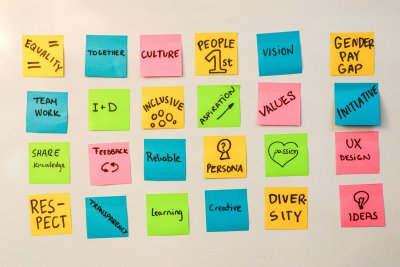
Diversifying your board: why it matters and how to get started
As an alliance, Sustain is privileged to work with many organisations across the sustainable food and farming sector. Over 35 organisations participated in our ‘How to be an anti-racist organisation’ programme earlier this year. One of the key concerns was a lack of diversity on their trustee boards.
In response we have developed practical guidance designed to help you take meaningful steps towards board diversity. Below, you’ll find actionable advice and inspiring examples from alliance members who are already making significant progress in this area.
Why diverse boards are stronger boards
A more diverse board transforms how your organisation makes decisions, engages with communities, and drives forward its mission. Here’s why:
Better decisions: Different backgrounds bring different perspectives, leading to smarter, more creative problem-solving.
Stronger connections: A board that looks like the communities you serve is better placed to understand their needs and build trust.
More innovation: When everyone at the table has had similar experiences, ideas can stagnate. Bringing in fresh voices leads to fresh thinking.
Increased resilience: A mix of skills, experiences, and viewpoints makes organisations more adaptable and ready for change.
What’s holding us back?
Many organisations want to diversify their board, but common barriers keep them stuck:
Closed networks: Many boards recruit from the same circles, missing out on talented people who don’t have the “right” connections.
Outdated ideas of who’s ‘board-ready’: Too often, we look for experience in governance and leadership, overlooking lived experience and fresh perspectives.
Time and money: Many board positions are unpaid, which can exclude people who can’t afford to volunteer their time.
Lack of inclusive culture: Even when diverse board members are recruited, they can feel like outsiders if real inclusion isn’t built into governance structures.
The key is to actively change how your board recruits, supports, and values people.
Sustain’s Story
At Sustain, we are still on our journey to equity but have made significant progress on board diversity since introducing ‘role share’ positions on our board. A role share is a way for two people to jointly hold a trustee position, with one person formally registered as the trustee and the other participating to gain experience, contacts and contribute their perspectives.
Sustain uses role shares to welcome younger people from under-represented ethnic and cultural backgrounds into charity leadership in a collaborative, non-hierarchical way. As a result, we have seen applications from more diverse candidates. Additionally, 2 role-share trustees have since graduated to full trustee positions.
Inspiration from the alliance: who’s doing it right?
We spoke to Women’s Environmental Network (Wen) and Students Organising for Sustainability UK (SOS-UK) for advice and inspiration. Here are the key takeaways from their journeys -
(Read their full stories here: Wen and SOS-UK)
1. Intentionality and a values-driven approach
Both organisations placed diversity and inclusion at the heart of their governance.
- SOS-UK embedded diversity as a founding principle, recognising the link between climate and racial justice.
- Wen engaged in deep internal reflection, anti-racism training, and conversations about power before taking practical steps.
Key takeaway: Diversifying the board is an intentional, values-led commitment, not an afterthought.
2. Personal, relational recruitment
Both charities used personal connections and community relationships to attract diverse candidates.
- SOS-UK engaged students already active in climate action and social justice spaces.
- Wen invited trusted local leaders and event collaborators to join the board.
Key takeaway: Relationship-based recruitment builds trust, ensures alignment with organisational values, and brings in candidates who might not apply through open calls.
3. Removing barriers and increasing accessibility
Both organisations adapted their structures to make board roles more accessible.
- SOS-UK used guaranteed interview schemes, role-sharing through a larger board, and reserved seats for under-30s.
- Wen offered hybrid meetings, travel expense coverage, governance training, mentoring, and pre-meeting support.
Key takeaway: Practical changes like flexible time commitments, financial support (within legal parameters), and training make participation possible for those who are less experienced or face barriers to involvement.
4. Creating inclusive board cultures
Both organisations go beyond recruitment to make sure trustees feel valued and empowered.
- SOS-UK avoids tokenism by having multiple representatives from diverse groups and encouraging trustees to shape organisational direction.
- Wen uses mentoring, buddying, and co-chairing opportunities to help new members feel confident and heard.
Key takeaway: Inclusion is an ongoing process. Boards must create a culture where every member feels able to contribute meaningfully.
5. Collective responsibility for diversity
Both organisations stress that diversity is not just the responsibility of minoritised board members.
- SOS-UK shares the responsibility across the whole board and uses staggered term limits to maintain representation.
- Wen continues to review who holds decision-making power and invites staff to attend board meetings to increase transparency.
Key takeaway: A diverse board works best when inclusion is seen as a shared, organisation-wide commitment rather than the job of a few individuals.
Now It’s Your Turn
Board diversity won’t happen overnight, but every step you take brings you closer to a more representative, effective, and resilient organisation.
So, what’s one action you can take this week to move towards a more diverse board? Whether it’s rethinking recruitment, offering a role-share, or reaching out to a new network, commit to taking one step forward.
Need more support?
Check out these resources:
- Getting on Board: How to Become a Trustee – a great guide for recruiting and retaining diverse trustees
- Action for Trustee Racial Diversity – supporting charities to diversify their boards
- Reach Volunteering – a platform to recruit trustees from diverse backgrounds
- Legal guidelines on trustee payments
- A Practical Guide to recruiting Black and Asian charity trustees
- Diversity equity and inclusion resources
- Trustees Unlimited guide



